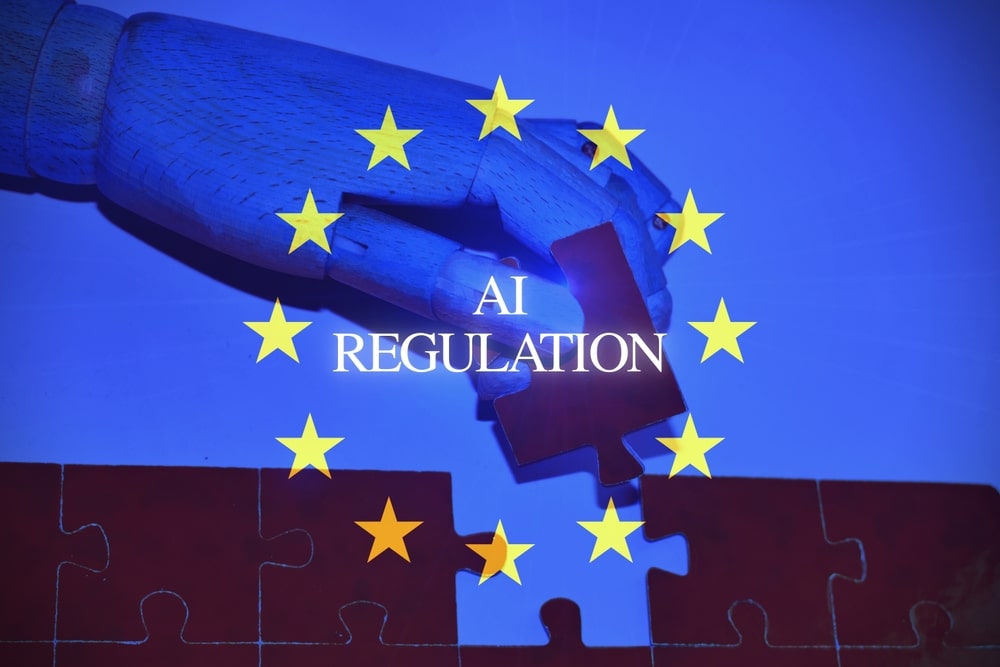The European Union Parliament granted the pending approval to the artificial intelligence law (the EU AI Act). The Wednesday, March 13 session’s approval is a milestone in enacting the pioneer AI regulations whose comprehensive scope aims for safe and ethical AI development.
The EU AI Act offers governance guidance across the 27-member states bloc to facilitate the development of trustworthy and safe AI that upholds fundamental rights in advancing innovation.
The announcement revealed that the EU AI Act garnered endorsement from 523, with 46 opposed and 49 abstentions.
EU AI Act Targets Creation of Safe and Human-Centric AI
A reflection of the virtual press conference held before the voting saw EU parliamentarian duo Dragos Tudorache and Brando Benifei inform the press that Wednesday marks a historic day in the EU blocks march to regulate AI. The latter hailed the legislation scope as geared towards creating safe and human-centric AI, thus reflecting the EU parliament’s priorities.
The AI legislation appeared in the pioneering proposal five years ago only to garner speed last year as developers released powerful AI models that attracted mass use.
Benifei indicated that the EU Parliament realized the provisional agreement, which had been identified as lengthy negotiations in December last year. It enabled the Internal Market and Civil Liberties Committees to reach a provisional deal following 71 votes in favour against eight during the February 13 session.
Tudorache urged fellow lawmakers that approving the EU AI Act will signal the seriousness of the block towards safety and human-centric innovation. The lawmaker reiterated the EU Parliament’s openness to helping others build AI governance alongside like-minded democracies.
The EU AI Act in Action
The approval of the EU AI Act facilitates the execution of minor linguistic changes during its translation phase, where newly approved laws are made available in the languages of the constituent states.
A recent EuroNews publication indicated that the bill will undergo the second vote scheduled for April before officially being published in the EU journal a month later.
The publication indicated that the prohibited practices stipulated in the EU AI Act will have their ban enforced in November. Benifei considers the ban will have a timeline before becoming mandatory.
Parties Affected by EU AI Act
The approval of the EU AI Act is set to bring comprehensive changes to tech innovation. The law classifies the machine learning models into four relative to the risk posed. The high-risk models will meet the extreme restrictive rules.
The EU considers the unacceptable risk category as warranting bans on all AI systems that clearly threaten safety. Also, the AI systems that threaten the existence of livelihoods and human rights will suffer the prohibition.
The unacceptable risk category features toys that tap voice assistance and encourage dangerous behaviour. The category features AI-powered systems executing remote biometric identification by scanning faces in the public.
The high-risk category comprises critical infrastructures and applications deployed for educational and vocational training and law enforcement, which contravene fundamental rights and justice administration.
The limited risk classification captures the transparency level requirements in AI usage. It stipulates the mechanism of interacting with the AI chatbots and the need for awareness of machine interaction and identification of AI-generated content.
Lastly, the EU AI Act has necessitated the creation of a Compliance Checker, allowing entities to assess whether they are subject to the legislation. Also, it accommodates the free use within the minimal risk classification of AI involving AI-enabled spam filters and video games. The legislators noted that most currently used AI systems are within the minimal risk category.
EU AI Act Seeks Compliance AI Chatbots
The newly approved AI legislation captures provisions on the generative AI models, given their popularity and usage, including Grok, Gemini and ChatGPT. The law requires general-purpose developers to submit detailed training data summaries and comply with the EU copyright law.
The legislation requires mandatory labelling of deepfake content that it captures artificially.
The road to approving the EU AI Act saw several tech companies lodge pushback urging the authorities to avoid overregulating AI.
The narrative is changing with IBM’s chief privacy officer, Christina Montgomery, hailing the EU Parliament for delivering the world’s first set of AI legislation.
The IBM executive labelled the risk-based approach adopted by the EU AI Act aligns with the tech giant’s commitment to ethical AI practices. She added that the legislation is comprehensive and smart without compromising the capacity to build trustworthy AI ecosystems.
At Tokenhell, we help over 5,000 crypto companies amplify their content reach—and you can join them! For inquiries, reach out to us at info@tokenhell.com. Please remember, cryptocurrencies are highly volatile assets. Always conduct thorough research before making any investment decisions. Some content on this website, including posts under Crypto Cable, Sponsored Articles, and Press Releases, is provided by guest contributors or paid sponsors. The views expressed in these posts do not necessarily represent the opinions of Tokenhell. We are not responsible for the accuracy, quality, or reliability of any third-party content, advertisements, products, or banners featured on this site. For more details, please review our full terms and conditions / disclaimer.



